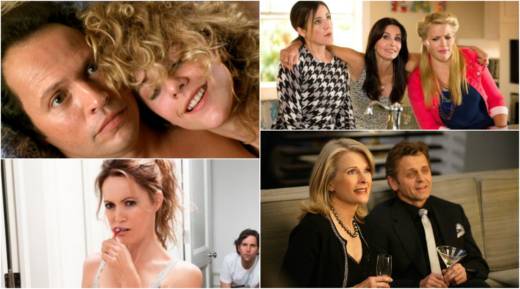I tell my mother I can't do this because I am bad at lying and will be found out immediately, like Leslie Mann's character in This is 40. Remembering This is 40 actually makes me feel worse about my impending birthday too, because that's a movie in which the protagonists have actually checked off all the milestones you're supposed to hit by the time you're 40 -- marriage, kids, and a nice, big, grown-up house. If they're stressing about the big four-oh, doesn't that mean that I, with my divorce and my one-bedroom and my no-children (even though the no-children is very much by choice), should be having a complete nervous breakdown?
The other thing I have been prepping myself for is the fact that no one is going to swipe right anymore because now I start with a 4, instead of a 3. This is actually, in part, the fault of a male friend who once told me, at the age of 46, that he had to break up with the woman he was dating because "She's 42. She's probably going to want this to move really fast." When I asked if he'd bothered to ask her if that was the case, he just said it again, "But she's 42..."
Maybe my friend was imbued with this degree of entitlement for the same reason 40 has always been my scary age; these are things straight men and women have been told our wholes lives to expect. Mine was a generation of women reaching adulthood just as Sex and the City was blowing up. It was supposed to signal our very own little sexual revolution, and, though it was nice to see women on TV who were as sexually liberated as the women in my own life, the show itself pushed some very unhelpful notions about prospects for older women.
Yes, SATC put 40-something, free-wheeling, sexual dynamo Samantha Jones on our screens, but it also told us she was the exception to the rule. In a Season 6 episode titled "Splat!" we see a 40-year-old woman literally fall out of a window and die because of her reluctance to stop partying. "When did everyone pair off?" is one of the last things she says.
In the same episode, we see a successful, attractive Vogue editor (played by Candice Bergen) scolding Carrie for dating an older man. "It's not fair," Enid says. "He's my age and you've got him and I am in No Man's Land -- literally. Men can date anyone, at any age, but let's be frank, most of them prefer the bimbos." We later see Enid settling for an unattractive bore, out of desperation. Hardly a heartening message for the older single women watching; you're either tragic for still wanting to have a good time, or totally desperate.
The episode was almost a continuation of the role Sarah Jessica Parker took on in 1996's The First Wive's Club, a movie about middle-aged women being ditched by their longtime husbands for younger women (SJP was one of them). The ultimate message of the movie is that divorce can be liberating, and independence is empowering, but it has little to offer women who've been raised to be liberated and empowered from the get-go.
Despite the 1998 instant classic How Stella Got Her Groove Back, little has shifted in the two decades since, in terms of positive representations of single women in their 40s and 50s. Let's face it, Jada Pinkett Smith’s character in Girl’s Trip was basically Stella 2.0, with a different backstory and a comedic twist.
Women over 60 have recently been seeing stereotypes about them smashed in Nancy Meyers movies like Something's Gotta Give and It's Complicated, as well as in Netflix triumph Grace and Frankie, but trying to find equivalents for single middle-aged heterosexual women is a little harder. When we think of non-reality TV shows about that age group, we think of Desperate Housewives and Cougar Town, two shows whose very names insult their goal demographic.
There have been a handful of positive movie representations in the last few years, including the Julia Louis Dreyfuss-starring Enough Said (2013), which offered a normalized look at middle-aged dating, and The Proposal (2009), which took the unusual step of giving us a romantic comedy lead in her 40s (because: Sandra Bullock).
2016's Equity was groundbreaking in its representations of successful middle-aged women, but even there, we saw them having limited romantic success because "men like a girl they can take care of."
In 1997, 47 percent of Generation X-ers said that being happily married was "one of the most important things" in life. That number dropped to 30 percent for Millennials. And there are census numbers to back it up. In 2010, CNN reported that: “About 46 percent of all households nationwide are maintained by a single person. That adds up to 52 million singles.” It's possible that relationship shifts are happening so fast in America that pop culture representations just haven't caught up to our new reality yet.
The problem partially lies, of course, with female representation on screen. 2017 figures from USC tell us that, in the top 100 films of 2016, only 34 had a female lead and only eight of those leads were over the age of 45. Behind the scenes, just 20.7 percent of producers, 13.2 percent of writers, and 4.2 percent of directors were women. With that in mind, it's no wonder movies aren't reflecting reality.


